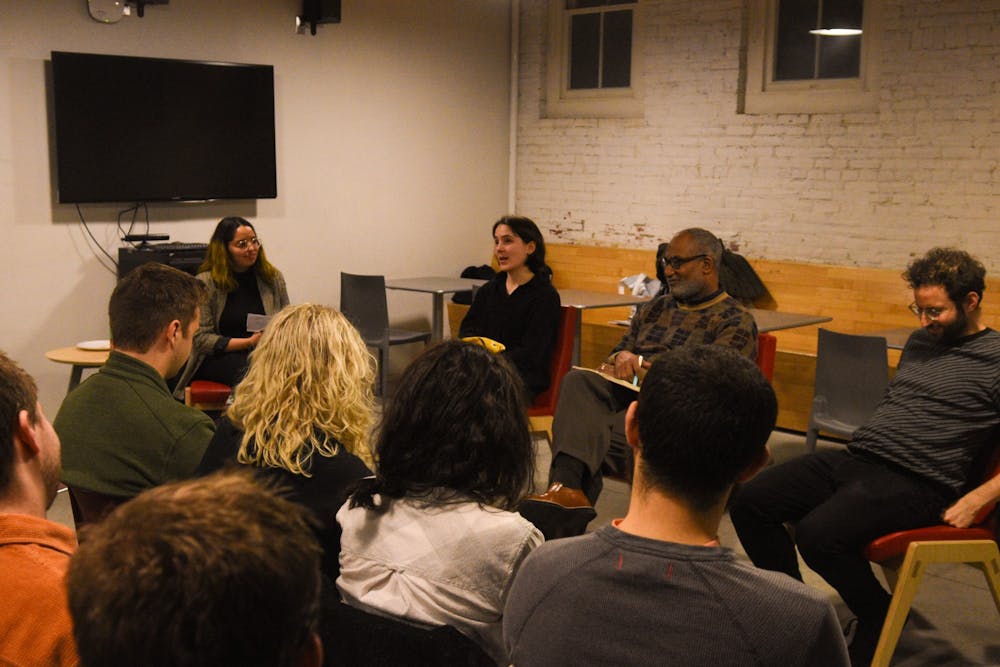Social justice activists spoke Monday night on the importance of using an intersectional approach to study the effects of climate change on communities of color.
PennFems, a discussion-based club for feminists of color, Fossil Free Penn, a divestment advocacy group, and Sister Sister, a support group for women of color, co-hosted a panel at the LGBT Center for an audience of 35 attendees. Panelists Lucy Corlett, a College senior and FFP coordinator; Herman Beavers, an English and Africana Studies professor; and Daniel Cohen, a Sociology assistant professor, offered their definitions of environmental injustice from the perspective of the marginalized communities that fall victim to it.
“Black and brown communities are not often studied as sites for scientific research, but as places to diagnose social problems,” Beavers said. “So one of the things environmental justice means to me is researching and spending time in Black and brown communities to really see what the impact of climate change is going to be.”
Cohen’s definition of environmental justice centered around the disproportionate toxicity and pollution in Black and brown communities around the country and the importance of abolishing those disparities.
The panelists identified gentrification and displacement as the roots of these discrepancies. They blamed Penn’s expansion into West Philadelphia and displacement of neighborhoods for community members being forced to move closer to toxic waste.

Lucy Corlett spoke about Penn's role in the gentrification of Philadelphia.
“There’s no way that you can be a Penn student and not be impacted by the way that gentrification has worked,” Beavers said. “The place where Hill College House is located was once a Black neighborhood,” he added, detailing a process in which Penn declared eminent domain on the neighborhood properties after asking if the residents wanted their neighborhood to be beautified.
Corlett said Penn’s construction of New College House West is another instance of gentrification, because it was built on “one of the last open spaces in this area, and used by a lot of non-Penn people.”
RELATED:
FFP protests outside Van Pelt for Global Divestment Day with local climate activists
About 100 Fossil Free Penn members shut down Board of Trustees meeting
Another factor that Corlett said highlights economic, racial, and environmental disparities among different neighborhoods in Philadelphia is the lack of district beautification programs in poorer neighborhoods, due to their tax-based funding.
The University City District is a special services district whose job is to clean up the neighborhood. Corlett said that while Penn benefits from its existence, poorer neighborhoods that do not make enough to pay for these services do not. She said this contributes to environmental racism because these communities face disproportionate amounts of litter and pollution.
College first-year and FFP coordinator Julie Flandreau said she enjoyed the event because the panelists spoke about environmental justice in terms of the human lives that are affected, rather than just advocating for recycling and other similar acts.
“For once, we’re talking about what is really at the root of the issue. Namely, how people are affected today and tomorrow in their health and their quality of life,” she said.

Daniel Cohen discussed the disproportionate toxicity and pollution in Black and brown communities.
College senior and PennFems facilitator Stephanie Diaz said she was pleased with the turnout. She said the intersectional topic of the panel allowed the collaboration of different campus activist groups.
Beavers complimented the hosts of the panel for having the conversation together, which he said he hopes will inspire future partnerships and additional intersectional dialogue. He also said Penn students should commit themselves to social justice for residents in the Philadelphia community, starting with those who work for the University.
“You are poorly educated if you go to this school and you think that the people who live in the surrounding neighborhood’s only purpose is to serve you french fries in the dining hall,” Beavers said.
College sophomore Marcela Gomez said she appreciated the “real” conversation about climate change and the diverse perspectives it included. But as an international student from Guatemala, she voiced her concern with climate change discussions at Penn and elsewhere, which she said use poorer countries as tokens to dramatize the damage of climate change.
She said Guatemala has been fighting climate change decades before it was a priority in the United States, but was ignored by more developed nations.
“You have to ask yourself why it gets named an emergency now, and not however many years ago when it was already hurting us,” she said. “I think the role of the United States in general and Penn students specifically is to go out and listen to those who are already in the fight, and to use their power to amplify the voices [of marginalized communities] and learn from their struggles.”









